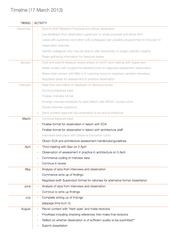|
When I e-mailed Michael just before Christmas I didn't expect an immediate response, and I certainly didn't anticipate that he would have gone into so much thought and detail. I'm going to post his full response below before working through the different items: Hello there, James, As ever, fantastic (and fantastically generous) stuff from Michael. To make best use of his tips I'm going to summarise them now in a separate post.
0 Comments
Leave a Reply. |
Categories
All
Archives
October 2013
TimelineOther stuff
|
